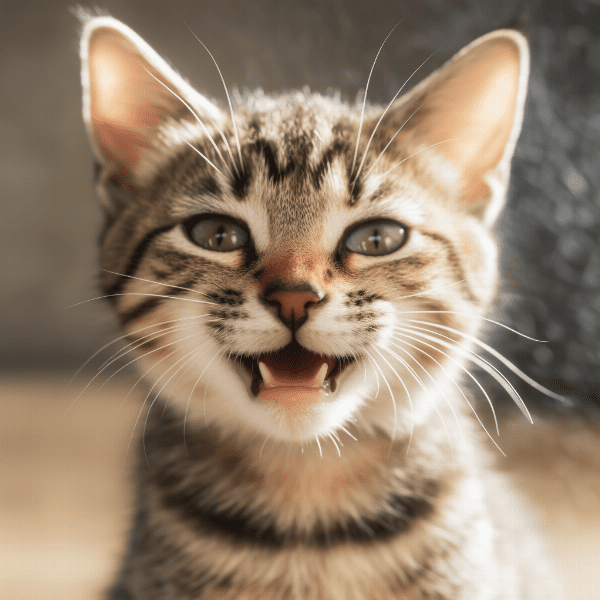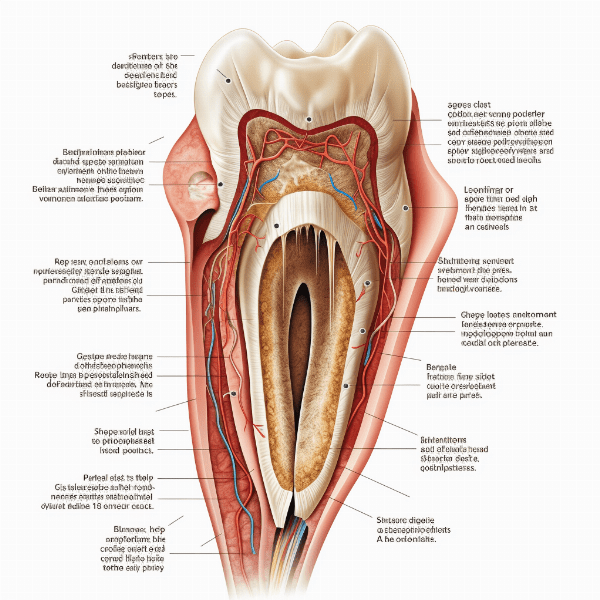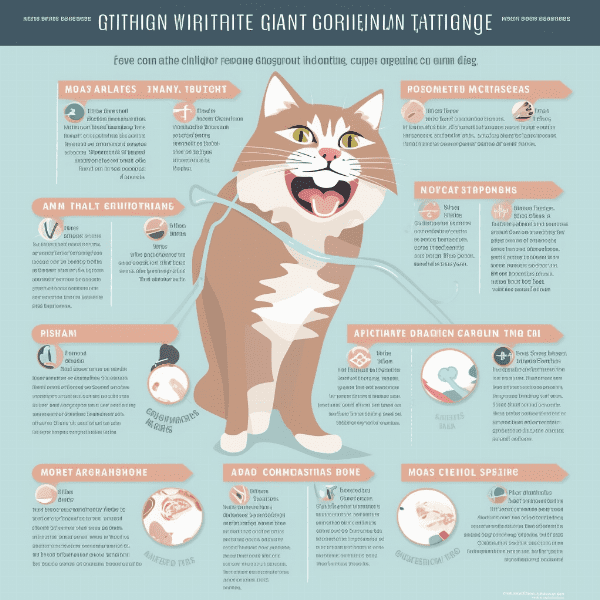Table of Contents
- What is Kitten Gingivitis?
- Causes of Kitten Gingivitis
- Signs and Symptoms to Look Out For
- Why Treating Kitten Gingivitis is Important
- Prevention Strategies for Kitten Gingivitis
- Veterinary Diagnosis and Treatment Options
- Home Remedies for Kitten Gingivitis
- Proper Dental Care for Kittens
- Diet and Nutrition for Kitten Oral Health
- Final Thoughts and Summary
What is Kitten Gingivitis?
Kitten gingivitis is a common condition in young cats where their gums become inflamed and irritated. This condition can affect kittens as young as three months old and, if left untreated, can lead to serious oral health problems.
The Causes of Kitten Gingivitis
There are several reasons why a kitten may develop gingivitis. Poor dental hygiene is one of the leading causes of the condition. This can be due to a lack of teeth brushing or not providing the kitten with the proper nutrition. Other factors such as viral infections, bacterial infections, and immune system disorders can also contribute to kitten gingivitis.
Symptoms of Kitten Gingivitis
It’s important to be aware of the symptoms of kitten gingivitis so that you can take action as soon as possible. Symptoms may include red and swollen gums, bad breath, drooling, difficulty eating, and tooth loss. If you notice any of these signs in your kitten, it’s essential to take them to a veterinarian immediately.
The Importance of Treating Kitten Gingivitis
Treating kitten gingivitis is essential for their overall health and well-being. If left untreated, the condition can progress to periodontitis, which can cause the loss of teeth and damage to the jawbone. Additionally, untreated gingivitis can lead to systemic infections and can affect other organs in the body.
In conclusion, kitten gingivitis is a common condition that can have serious implications if left untreated. By understanding the causes, symptoms, and importance of treatment, you can help ensure that your kitten maintains optimal oral health.
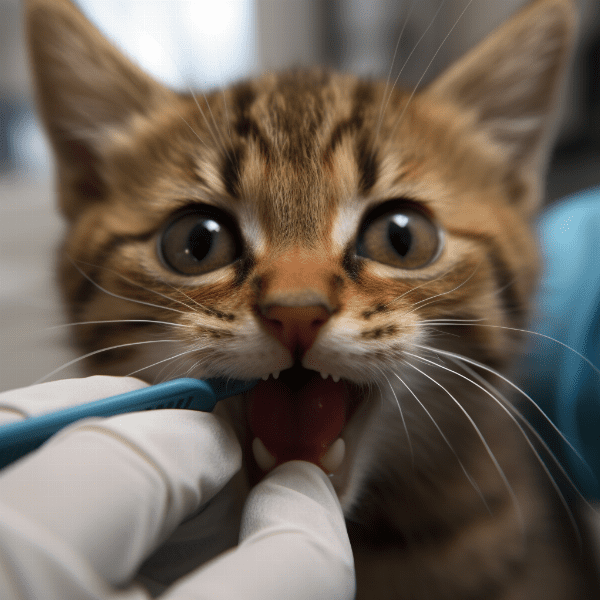
Causes of Kitten Gingivitis
As mentioned earlier, poor dental hygiene is one of the most common causes of kitten gingivitis. However, there are several other factors that can contribute to the development of this condition.
Viral Infections
Viruses such as feline leukemia virus (FeLV) and feline immunodeficiency virus (FIV) can weaken a kitten’s immune system, making them more susceptible to developing gingivitis. These viruses can also cause secondary bacterial infections that may worsen the condition.
Bacterial Infections
Bacteria such as Porphyromonas and Fusobacterium are commonly found in the oral cavity of cats and can lead to gingivitis if they overgrow. The accumulation of bacteria and debris on the teeth can cause inflammation of the gums.
Diet
A kitten’s diet plays a significant role in their oral health. A diet that is deficient in nutrients such as calcium and vitamin D can lead to weak teeth and gums. Additionally, feeding a diet that is high in carbohydrates can lead to the accumulation of plaque and tartar, which can contribute to gingivitis.
Genetics
Some kittens may have a genetic predisposition to developing gingivitis. This can be due to abnormalities in the immune system that make them more susceptible to bacterial infections and inflammation.
In conclusion, there are several factors that can contribute to the development of kitten gingivitis. By understanding these causes, you can take steps to prevent the condition from occurring in the first place.
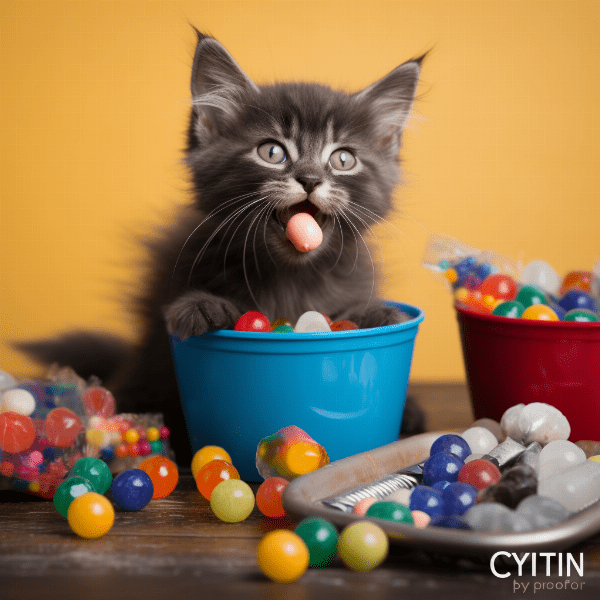
Signs and Symptoms to Look Out For
As a responsible pet owner, it’s important to be aware of the signs and symptoms of kitten gingivitis so that you can seek veterinary care as soon as possible.
Red and Swollen Gums
One of the most common signs of gingivitis is red and swollen gums. This inflammation can be painful for your kitten and can make eating difficult.
Bad Breath
If your kitten’s breath smells foul, it may be a sign of gingivitis. This odor is caused by the accumulation of bacteria and debris on the teeth and gums.
Difficulty Eating
Gingivitis can make it difficult for your kitten to eat, especially if they are experiencing pain or discomfort. If your kitten is avoiding certain types of food or seems to be eating less than usual, it may be a sign of gingivitis.
Drooling
Excessive drooling can be a sign of many different health problems, including gingivitis. If you notice that your kitten is drooling more than usual, it’s important to take them to a veterinarian to determine the cause.
Tooth Loss
In advanced cases of gingivitis, your kitten may experience tooth loss. This can occur as a result of damage to the gums and jawbone caused by inflammation.
In conclusion, being aware of the signs and symptoms of kitten gingivitis is essential for maintaining your kitten’s oral health. If you notice any of these symptoms, it’s important to seek veterinary care as soon as possible to prevent the condition from progressing.
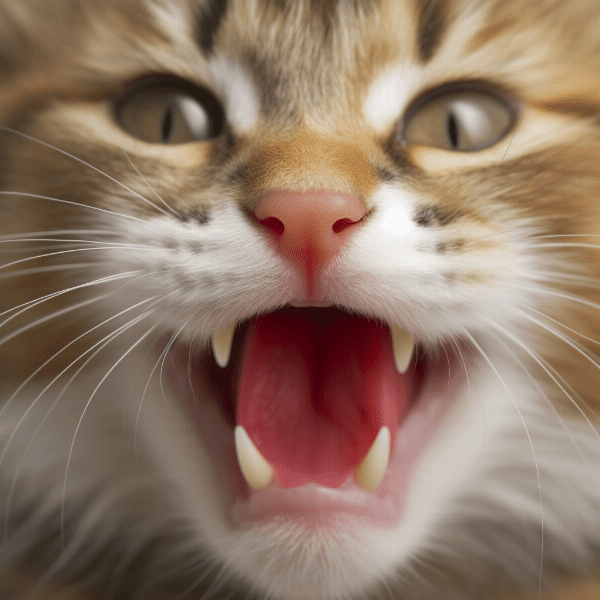
Why Treating Kitten Gingivitis is Important
Treating kitten gingivitis is crucial for maintaining their overall health and well-being. Here are some reasons why:
Preventing Further Oral Health Problems
If left untreated, kitten gingivitis can progress to more severe conditions such as periodontitis, which can lead to tooth loss and damage to the jawbone. By treating gingivitis early on, you can prevent these more serious oral health problems from developing.
Avoiding Systemic Infections
Gingivitis can also lead to systemic infections if the bacteria from the oral cavity enter the bloodstream. This can cause infections in other parts of the body, such as the heart, liver, and kidneys. By treating gingivitis, you can prevent the spread of these harmful bacteria.
Alleviating Pain and Discomfort
Gingivitis can be painful and uncomfortable for your kitten, making it difficult for them to eat and drink. By treating the condition, you can alleviate their discomfort and improve their quality of life.
Improving Overall Health
Maintaining good oral health is essential for your kitten’s overall health. Poor oral health can lead to a range of health problems, including infections, heart disease, and diabetes. By treating gingivitis, you can help ensure that your kitten remains healthy and happy.
In conclusion, treating kitten gingivitis is important for preventing further oral health problems, avoiding systemic infections, alleviating pain and discomfort, and improving overall health. If you suspect that your kitten has gingivitis, it’s essential to seek veterinary care as soon as possible to prevent the condition from worsening.
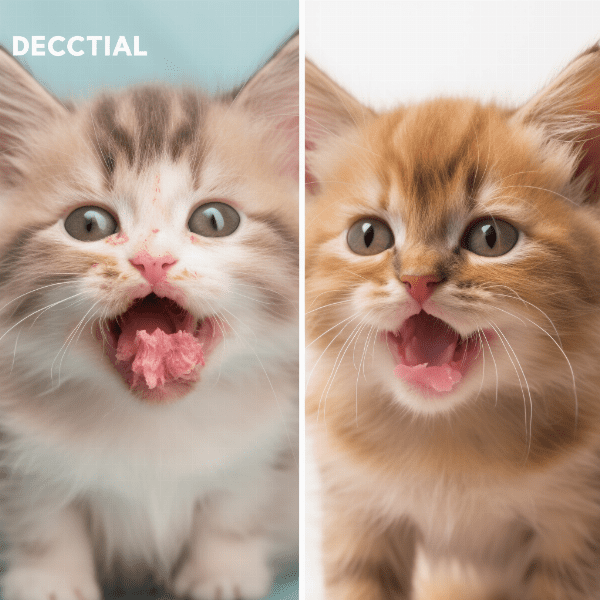
Prevention Strategies for Kitten Gingivitis
Preventing kitten gingivitis is key to maintaining optimal oral health. Here are some strategies to help prevent the condition from developing:
Dental Hygiene
Proper dental hygiene is essential for preventing gingivitis. This includes brushing your kitten’s teeth regularly with a toothbrush and toothpaste specifically designed for cats. You can also use dental treats and toys to help clean their teeth and promote healthy gums.
Monitor for Signs of Gingivitis
Being aware of the signs and symptoms of gingivitis is important for catching the condition early on. Regularly check your kitten’s teeth and gums for any signs of redness, swelling, or bleeding.
.
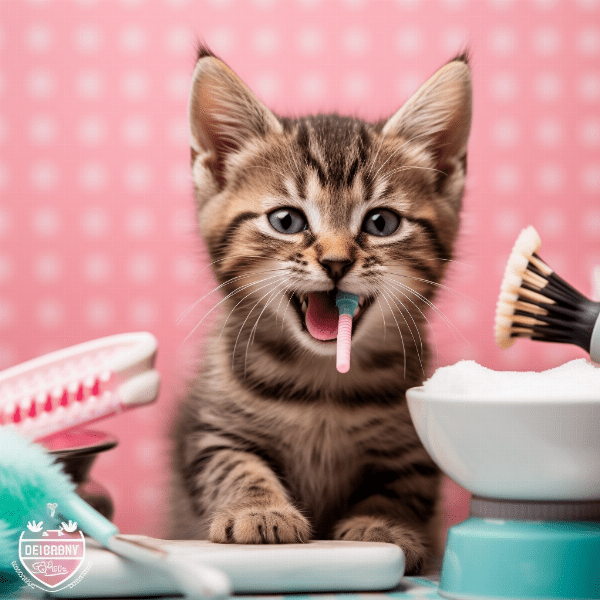
Veterinary Diagnosis and Treatment Options
If you suspect that your kitten has gingivitis, it’s important to seek veterinary care as soon as possible. Your veterinarian can diagnose the condition and recommend appropriate treatment options.
Diagnosis
To diagnose gingivitis, your veterinarian will perform a physical examination of your kitten’s mouth, teeth, and gums. They may also take x-rays to check for any damage to the jawbone or teeth. Additionally, they may perform a blood test to check for any underlying health problems that may be contributing to the condition.
Treatment
Treatment options for kitten gingivitis may include:
- Dental cleaning: This involves removing any plaque and tartar buildup on the teeth and gums. Your veterinarian may perform this procedure under anesthesia to ensure that your kitten is comfortable.
- Antibiotics: If your kitten has a bacterial infection, your veterinarian may prescribe antibiotics to help clear the infection and reduce inflammation.
- Pain medication: If your kitten is experiencing pain and discomfort, your veterinarian may prescribe pain medication to help alleviate their symptoms.
- Nutritional supplements: Your veterinarian may recommend nutritional supplements, such as calcium or vitamin D, to help promote healthy teeth and gums.
Follow-Up Care
After treatment, it’s important to follow your veterinarian’s recommendations for follow-up care. This may include regular dental cleanings and check-ups to monitor your kitten’s oral health and prevent the condition from recurring.
In conclusion, seeking veterinary care is essential for diagnosing and treating kitten gingivitis. By following your veterinarian’s recommendations for treatment and follow-up care, you can help ensure that your kitten maintains optimal oral health.
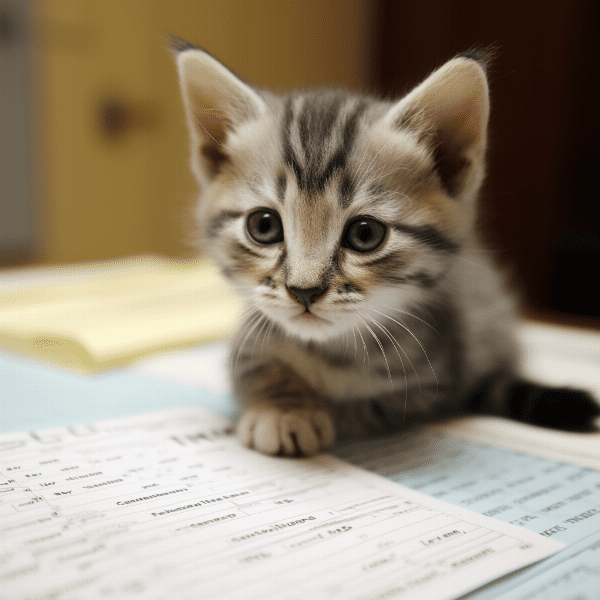
Home Remedies for Kitten Gingivitis
While seeking veterinary care is the best course of action for treating kitten gingivitis, there are also some home remedies that can help alleviate your kitten’s symptoms.
Saltwater Rinse
A saltwater rinse can help reduce inflammation and promote healing in the gums. Mix a small amount of salt with warm water and use a cotton swab or cloth to gently apply the solution to your kitten’s gums.
Coconut Oil
Coconut oil has natural antibacterial properties and can help reduce inflammation in the gums. Apply a small amount of coconut oil to your kitten’s gums using a cotton swab or cloth.
Chamomile Tea
Chamomile tea has natural anti-inflammatory properties and can help reduce pain and swelling in the gums. Brew a cup of chamomile tea, allow it to cool, and then apply it to your kitten’s gums using a cotton swab or cloth.
Soft Food
Feeding your kitten soft food can help alleviate their pain and discomfort while they recover from gingivitis. Soft food is easier to chew and won’t irritate their gums as much as hard kibble.
.
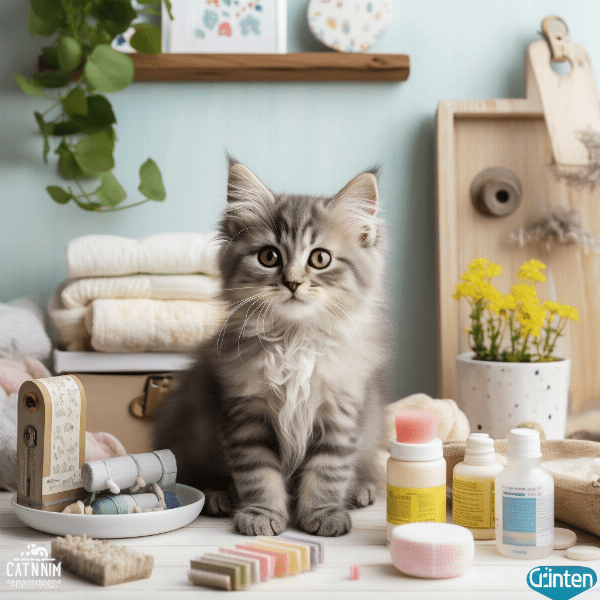
Proper Dental Care for Kittens
Maintaining proper dental hygiene is essential for preventing kitten gingivitis and other oral health problems. Here are some tips for proper dental care for kittens:
Brushing Teeth
Brushing your kitten’s teeth regularly is the best way to prevent gingivitis and promote healthy teeth and gums. Use a toothbrush and toothpaste specifically designed for cats, and brush their teeth at least once a day. Be sure to be gentle and use a soft-bristled toothbrush to avoid causing any pain or discomfort.
Dental Treats and Toys
Providing your kitten with dental treats and toys can help keep their teeth clean and healthy. Look for treats and toys that are specifically designed to clean teeth and massage the gums. Be sure to supervise your kitten while they are chewing on these items to ensure that they don’t accidentally swallow any pieces.
Water Consumption
Encouraging your kitten to drink plenty of water can help keep their mouth hydrated and promote the production of saliva, which helps to naturally clean the teeth and gums. Make sure your kitten always has access to fresh, clean water.
In conclusion, proper dental care is essential for maintaining your kitten’s oral health. By implementing these tips, you can help prevent gingivitis and other oral health problems, and ensure that your kitten maintains healthy teeth and gums. If you suspect that your kitten has gingivitis, seek veterinary care as soon as possible to prevent the condition from worsening.
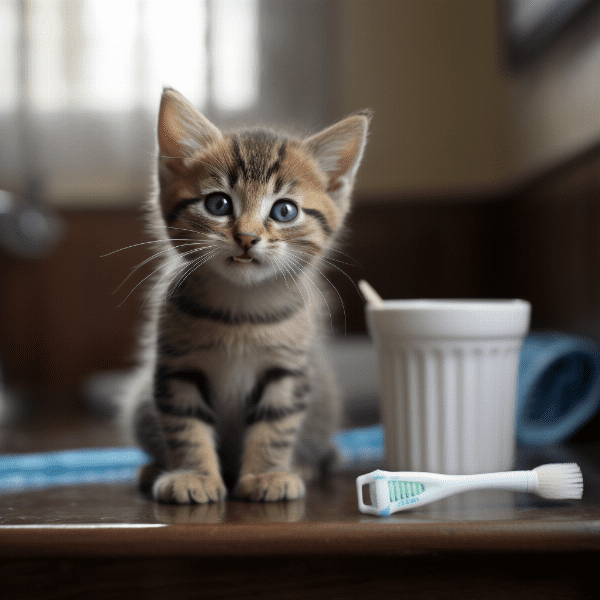
Diet and Nutrition for Kitten Oral Health
Feeding your kitten a healthy and balanced diet is crucial for their oral health. Here are some tips for diet and nutrition for kitten oral health:
Choose High-Quality Cat Food
Choose high-quality cat food that is specifically formulated to promote healthy teeth and gums. Look for cat food that is rich in nutrients such as calcium and vitamin D, which help promote strong teeth and gums. Additionally, make sure that the cat food is free of artificial preservatives, colors, and flavors, which can contribute to poor oral health.
Avoid Feeding Human Food
Avoid feeding your kitten human food, as it can lead to poor oral health and other health problems. Human food is often high in sugar and carbohydrates, which can contribute to the accumulation of plaque and tartar on the teeth and gums.
Dental Chews and Treats
Dental chews and treats can help promote healthy teeth and gums by removing plaque and tartar buildup. Look for dental chews and treats that are specifically designed to clean teeth and massage the gums.
Provide Plenty of Water
Drinking plenty of water is important for maintaining good oral health. Water helps to rinse away food particles and bacteria from the mouth, reducing the risk of tooth decay and gum disease. Make sure your kitten always has access to fresh, clean water.
Vitamin and Mineral Supplements
Some vitamins and minerals are essential for maintaining healthy teeth and gums. Talk to your veterinarian about vitamin and mineral supplements that can help promote healthy teeth and gums.
In conclusion, maintaining a healthy and balanced diet is essential for your kitten’s oral health. By choosing high-quality cat food, avoiding feeding human food, providing dental chews and treats, providing plenty of water, and considering vitamin and mineral supplements, you can help ensure that your kitten maintains healthy teeth and gums. If you suspect that your kitten has gingivitis, seek veterinary care as soon as possible to prevent the condition from worsening.
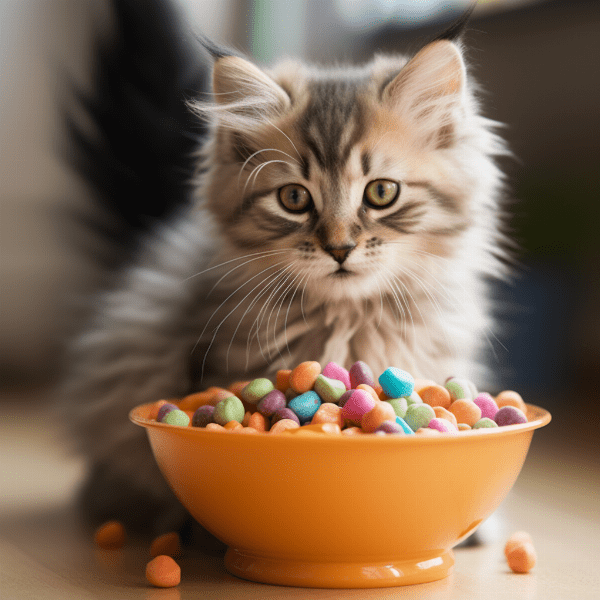
Final Thoughts and Summary
Kitten gingivitis is a common condition that can cause pain and discomfort for your furry friend. However, with proper care and treatment, you can help prevent the condition from developing and alleviate your kitten’s symptoms.
In summary, here are some key points to keep in mind:
- Kitten gingivitis is an inflammation of the gums that can lead to more severe oral health problems if left untreated.
- The causes of kitten gingivitis include poor dental hygiene, bacterial infections, and underlying health conditions.
- Signs and symptoms of kitten gingivitis include redness and swelling of the gums, bleeding, and bad breath.
- Treating kitten gingivitis is important for preventing further oral health problems, avoiding systemic infections, alleviating pain and discomfort, and improving overall health.
- Prevention strategies for kitten gingivitis include proper dental hygiene, a healthy diet, regular veterinary check-ups, and monitoring for signs of gingivitis.
- Veterinary diagnosis and treatment options for kitten gingivitis include dental cleaning, antibiotics, pain medication, and nutritional supplements.
- Home remedies for kitten gingivitis include saltwater rinse, coconut oil, chamomile tea, soft food, and dental treats and toys.
- Proper dental care for kittens includes brushing teeth regularly, providing dental chews and treats, feeding a healthy diet, regular veterinary check-ups, and encouraging water consumption.
- Diet and nutrition play a crucial role in maintaining healthy teeth and gums. Choose high-quality cat food, avoid feeding human food, provide dental chews and treats, provide plenty of water, and consider vitamin and mineral supplements.
In conclusion, by taking the appropriate steps to prevent and treat kitten gingivitis, you can help ensure that your furry friend maintains optimal oral health and lives a happy, healthy life. If you suspect that your kitten has gingivitis, seek veterinary care as soon as possible to prevent the condition from worsening.
